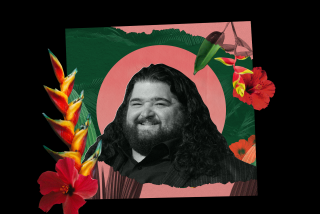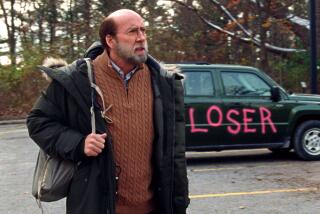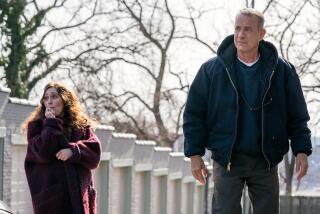A Mirage Amid the Survivor Tale
Just a single space separates âCast Awayâ from âCastaway,â but there is a universe of difference in the implications of those words. In truth, that gap summarizes the disparity between the film director Robert Zemeckis, writer William Broyles Jr. and star Tom Hanks think theyâve made and what is actually on the screen.
âCast Awayâ is the filmâs actual title, and it implies philosophical questions about whatâs thrown aside and whatâs retained, whatâs important in life and what isnât. Itâs the right title for a film that Zemeckis describes in the press notes as being about âthe survival of the human spirit and an illustration of the idea that surviving is easy, itâs living thatâs difficult.â
That high-minded picture, however, is only sporadically in front of us. Something unfortunate happened on the way to making it: The filmmakers got waylaid by what feels like a boyish enthusiasm for the survivalist aspects of a Robinson Crusoe tale of a man shipwrecked on an island, an enthusiasm that does not translate to the viewer.
As a result, so much time is spent on a handsomely made, instructive but finally tedious blow-by-blow training film on island survival that it throws the entire venture out of balance, capsizing the enterprise and making it difficult to keep any kind of message afloat. Which is how âCast Awayâ became âCastawayâ in fact if not in name.
The filmâs basic idea of a guy isolated on a speck of land originated with Hanks, and itâs not difficult to see why it intrigued him as a change of pace and why its self-imposed challenges of shooting on a remote Fiji locale over 16 months--including an unprecedented one-year hiatus for the actor to lose enough weight and grow enough hair to make his long island sojourn believable--appealed to Hanksâ âForrest Gumpâ director Zemeckis.
As weâve come to expect from Zemeckis, âCast Awayâsâ level of filmmaking is top of the line. Sweeping camera movements and masterful visuals (courtesy of cinematographer Don Burgess) are plentiful, sound virtuoso Randy Thomâs work is especially in evidence, and so much prodigious care has been taken with details across the board that even the dirty snow of Moscow visible in early scenes has been rendered with complete authenticity. All this expertise, however, one has to ask, is in service of what?
For despite all these good things, âCast Awayâ comes off as convincing but never compelling. Thereâs a ponderous quality to it, as if itâs forever clearing its throat to say something of value that doesnât quite get articulated. In truth, the film doesnât even begin to get emotionally involving until its final 30 minutes, at which point itâs been running for nearly two hours, which is very late in the game indeed.
*
One of âCast Awayâsâ odder aspects is that it plays like an extensive advertorial for the Federal Express shipping service. Hanks plays Chuck Noland, a FedEx systems engineer first glimpsed giving new employees in Moscow a spirited pep talk.
Chuck, it turns out, is the ultimate can-do company man who lives and dies by the clock. âWe can never allow ourselves the sin of losing track of time,â he roars at befuddled Muscovites. No problem is unsolvable for a man who does whatever it takes to get a package delivered.
Back home in Memphis, Tenn., Chuck has a loving girlfriend named Kelly Frears (Helen Hunt), who knows enough about her man not to be surprised when yet another emergency takes him away on Christmas Eve. The couple exchange presents in a Jeep Cherokee at the airport (she gives him a family heirloom watch with her picture in it) and he vows, âIâll be here New Yearâs Eve, I promise.â Not quite.
For the FedEx cargo plane Chuck is hitching a ride on goes down (in an unnervingly realistic storm and crash) over the Pacific, and Chuck washes up on a deserted island as pristine as the tropical locale Jodie Foster ended up in Zemeckisâ âContact.â And, for at least an hour, âCast Away,â which has already put a lot of minutes into marking time, comes to a halt.
Though it feels heretical to say so, given how much expense and trouble went into creating it, Chuckâs stretch on that spot comes off as boring and anticlimactic. The possibilities for a man alone on an island are not infinite, quite the opposite. Any situation Chuck might conceivably face has already been endlessly explored in other movies, so the conditions for surprise and interest are close to nonexistent. What weâre left with is a home movie of a trip weâre glad we werenât on, a visual version of the current best-selling âThe Worst Case Scenario Handbook.â
In theory, having Hanks, an excellent and well-loved performer, as our surrogate on the island should compensate for this, and it does, just not enough. He is an actor whose partisan we become without having to think about it, but because his character is alone he canât resist overdoing the inevitable actorish touches until weâre watching a one-man stage show more than a movie performance.
Just when weâre ready to write âCast Awayâ off, however, the locale shifts off the island and, almost immediately, like the flipping of a switch, things get more intriguing. The scenario goes from predictable to involving and the change from monologue to dialogue leads to Broylesâ best, most emotional writing. But by then the film is about 80% over, and this, its most interesting section, comes off as severely truncated and shortchanged. What âCast Awayâ itself has squandered and cast aside in its pursuit of Boysâ Life heroics is its own potential for success.
* MPAA rating: PG-13, for some intense images and action sequences. Times guidelines: a truly frightening plane crash and storm.
âCast Awayâ
Tom Hanks: Chuck Noland
Helen Hunt: Kelly Frears
Nick Searcy: Stan
Chris Noth: Jerry Lovett
Twentieth Century Fox and DreamWorks present an ImageMovers/Playtone production, released by Twentieth Century Fox. Director Robert Zemeckis. Producers Steve Starkey, Tom Hanks, Robert Zemeckis, Jack Rapke. Executive producer Joan Bradshaw. Screenplay by William Broyles Jr. Cinematographer Don Burgess. Editor Arthur Schmidt. Costume designer Joanna Johnston. Music Alan Silvestri. Production designer Rick Carter. Art directors Jim Teegarden, Stefan Dechant, Elizabeth Lapp. Set decorators Rosemary Brandenburg, Karen OâHara. Running time: 2 hours, 23 minutes.
In general release.
More to Read
Only good movies
Get the Indie Focus newsletter, Mark Olsen's weekly guide to the world of cinema.
You may occasionally receive promotional content from the Los Angeles Times.











